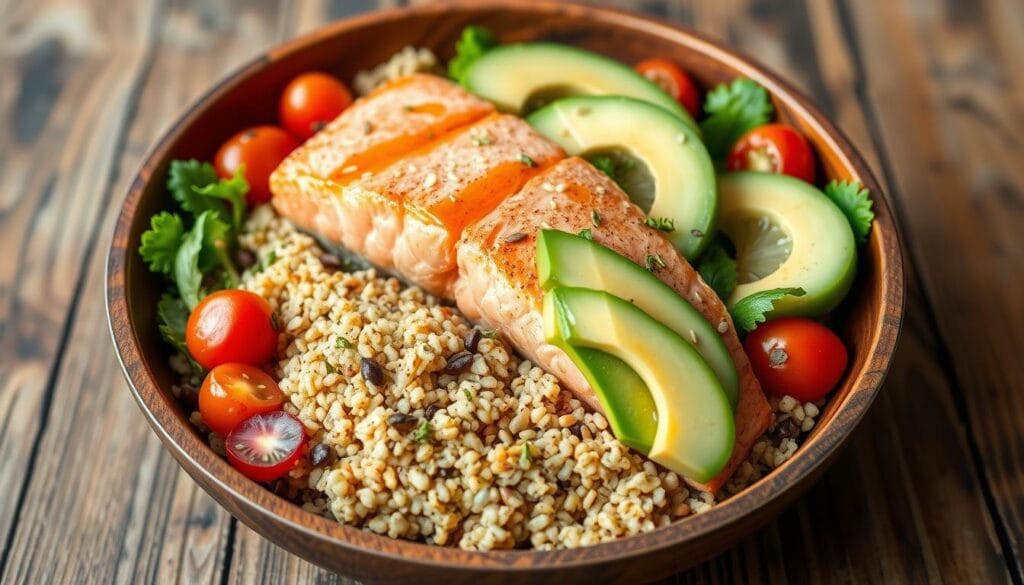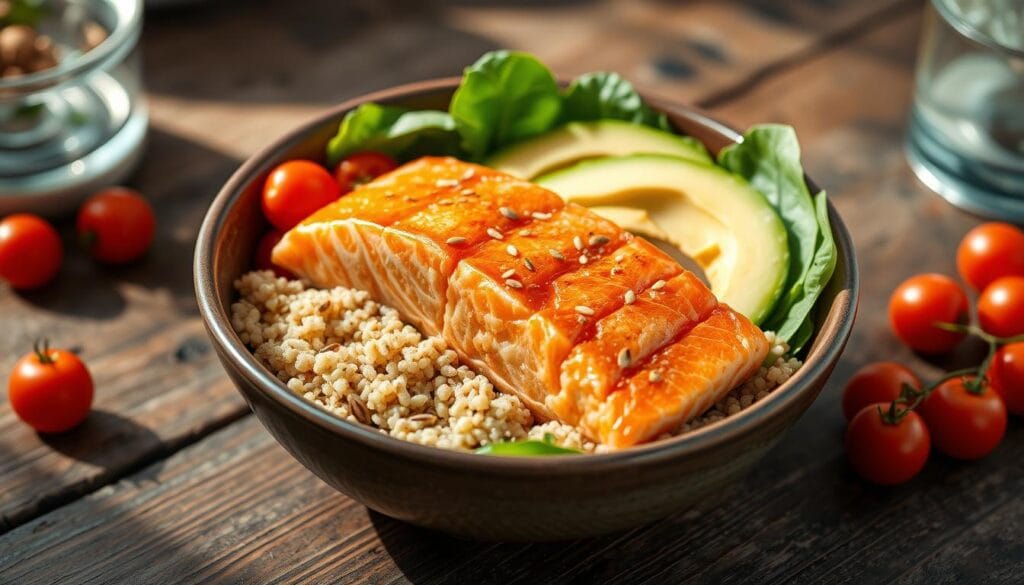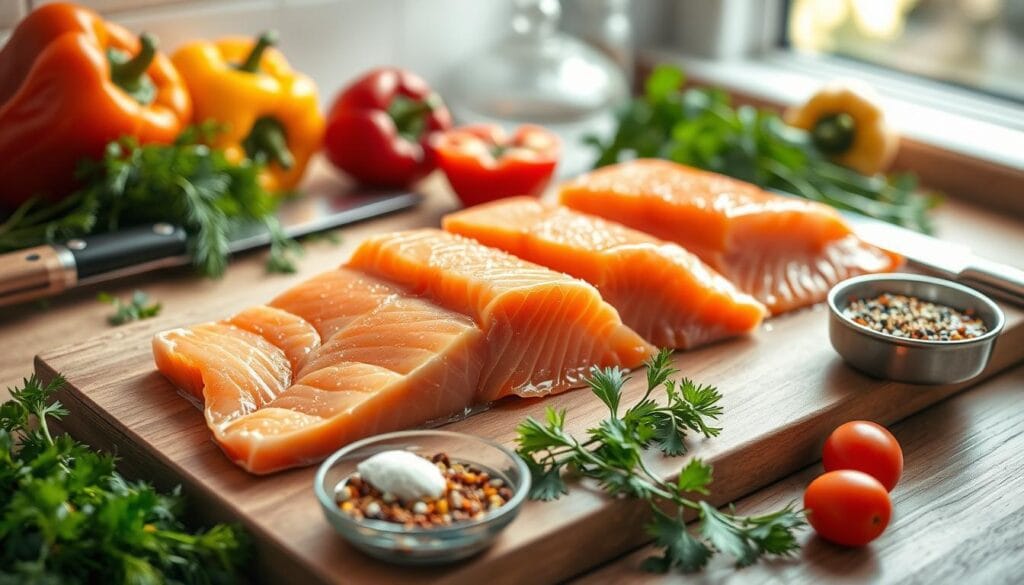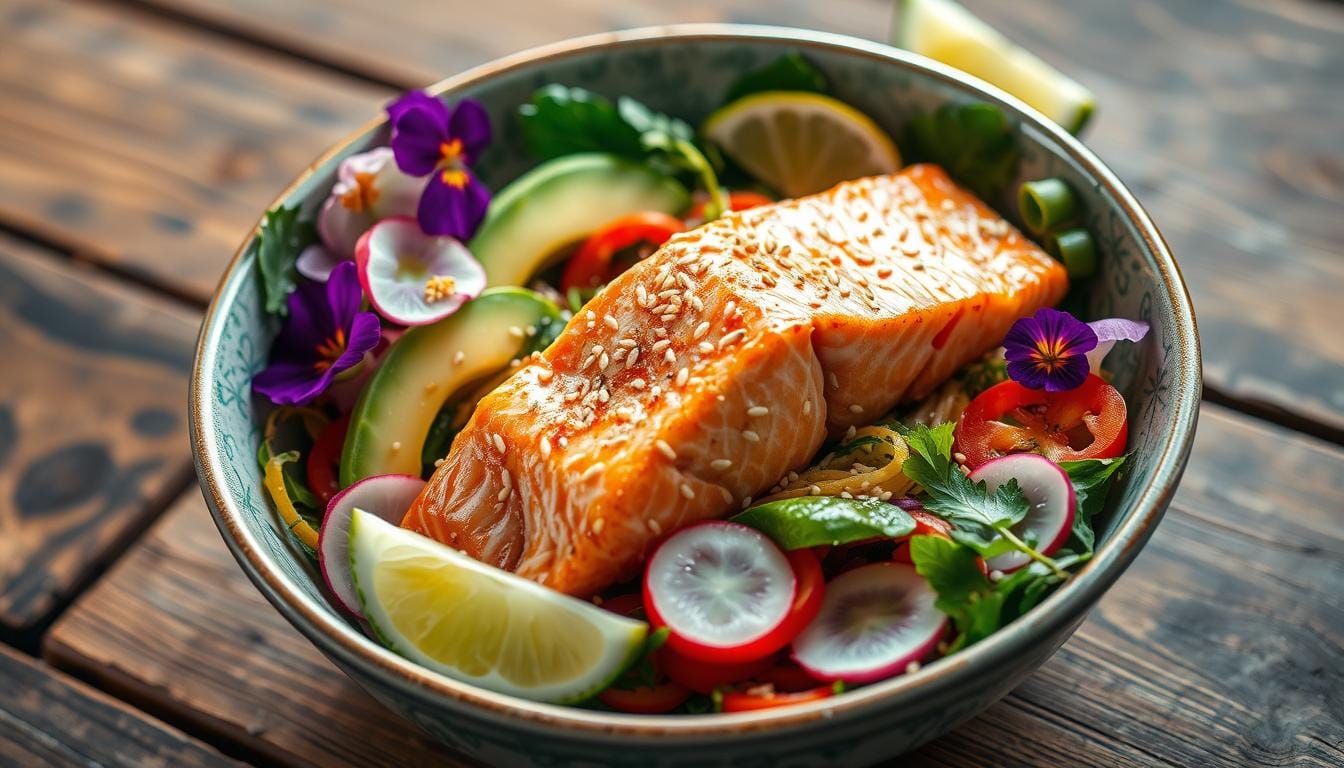Salmon bowls are a tasty and healthy meal choice. They mix flaky salmon with fluffy rice, crisp veggies, and tasty sauces. These bowls are great for quick dinners or meal prep because you can customize them easily.
They’re packed with lean protein, healthy fats, and fiber. This makes them a top pick for a protein-rich meal or a healthy lunch.
You can grill, bake, or air-fry the salmon in your bowl. This lets you try different flavors, from Asian teriyaki to Mediterranean avocado dressing. The choices are endless for making your ideal salmon bowl.
We’ll dive into the main ingredients, health benefits, and how to make them. You’ll learn to make your own healthy and tasty salmon bowls at home. Get ready for a meal that’s both satisfying and good for you.
Understanding the Salmon Bowl Concept
Salmon bowls are a hit, mixing fresh salmon with healthy ingredients. They’re like a sushi roll without the roll. You get cooked or raw salmon, rice, and fresh veggies, all topped with tasty sauces.
What is a Salmon Bowl?
A salmon bowl is a meal that you can make your own. It has:
- Cooked or raw salmon
- Rice (like brown, sushi, or jasmine)
- Fresh veggies (like cucumbers, carrots, and avocado)
- Sauces or dressings (like soy sauce or spicy mayo)
Key Ingredients for a Salmon Bowl
Salmon bowls are all about trying new things. You can add:
- Protein: Cooked salmon, tuna, or tofu for a plant-based option
- Grains: Brown rice, sushi rice, or cauliflower rice
- Vegetables: Cucumber, carrots, avocado, edamame, bell peppers
- Toppings: Sesame seeds, furikake flakes, sliced green onions
- Sauces: Teriyaki, soy sauce, spicy mayo, or creamy avocado dressing
By mixing these ingredients, you can make a fish bowl, sushi bowl, or poke bowl. It’s a dish that looks good and tastes great.

“Salmon bowls are a delicious and nutritious way to enjoy the benefits of fresh seafood, while allowing for endless customization to suit your taste preferences.”
Nutritional Benefits of Salmon
Salmon is a nutritional powerhouse, full of essential nutrients for your health. It’s rich in omega-3 fatty acids and vitamins and minerals.
Omega-3 Fatty Acids and Your Health
Salmon is a great source of omega-3 fatty acids, like EPA and DHA. These fats are good for your heart. They can lower blood pressure, reduce inflammation, and boost brain function.
Eating salmon often can greatly improve your heart health and overall life quality.
Vitamins and Minerals in Salmon
Salmon is also full of high-quality protein, about 22-25 grams per 3.5-ounce serving. It has vitamins B12, selenium, niacin, and potassium. These nutrients are key for strong bones, a healthy immune system, and good organ function.
Adding salmon to a seafood bowl with whole grains, vegetables, and other ingredients makes a balanced meal. This meal is packed with nutrients to support your health and wellness.
| Nutrient | Wild Salmon | Farmed Salmon |
|---|---|---|
| Calories | 182 per 3.5 oz | 206 per 3.5 oz |
| Protein | 25 g per 3.5 oz | 22 g per 3.5 oz |
| Fat | 8 g per 3.5 oz | 12 g per 3.5 oz |
| Vitamin B12 | 127% of DV | 117% of DV |
| Selenium | 85% of DV | 75% of DV |
| Niacin | 63% of DV | 50% of DV |
| Potassium | 13% of DV | 8% of DV |
Adding salmon to your seafood bowl brings in healthy fats and essential nutrients. It’s a nutritious and tasty choice for a balanced diet.

How to Prepare Salmon for Your Bowl
Salmon is a versatile fish that can be prepared in various ways. You can grill, bake, air fry, or pan-sear it. Each method gives your smoked salmon a unique flavor and texture.
Grilling vs. Baking Salmon
Grilling salmon over medium-high heat adds a char and smoky flavor. Baking it in the oven at 400°F (204°C) for 8-10 minutes makes it tender and flaky. Choose based on your preference and available equipment.
Seasoning Ideas for Salmon
- Teriyaki: Brush the salmon with a mix of brown sugar, low-sodium soy sauce, and sriracha for a sweet and savory taste.
- Lemon and Dill: Season with lemon juice, fresh dill, and salt and pepper for a bright and herbal flavor.
- Simple Salt and Pepper: A simple seasoning of salt and pepper lets the salmon’s natural flavor shine.
For a quick option, use pre-cooked or canned salmon. Adjust the cooking method and seasoning to your liking.
| Nutrient | Amount per Serving |
|---|---|
| Calories | 652 |
| Calories from Fat | 243 |
| Total Fat | 27g |
| Saturated Fat | 4g |
| Trans Fat | 0.02g |
| Polyunsaturated Fat | 10g |
| Monounsaturated Fat | 11g |
| Cholesterol | 80mg |
| Sodium | 905mg |
| Potassium | 1108mg |
| Total Carbohydrates | 63g |
| Fiber | 5g |
| Sugar | 11g |
| Protein | 34g |
| Vitamin A | 251IU |
| Vitamin C | 26mg |
| Calcium | 75mg |
| Iron | 3mg |

“Salmon is a fantastic source of omega-3 fatty acids, which have been shown to have numerous health benefits. By incorporating salmon into your salmon bowls, you can enjoy a delicious and nutritious meal.”
Choosing the Right Base for Your Bowl
When making a healthy lunch or a tasty Japanese cuisine dish, the base is key. From greens to grains, the right choice can make all the difference. Let’s look at the best options for your salmon bowl.
Rice Options: Brown, Sushi, or Cauliflower
Rice is a favorite for salmon bowls, offering a filling base. Here are some great options:
- Brown rice: It’s full of fiber and has a nutty taste, making your bowl more satisfying.
- Sushi rice: Its sticky, sweet flavor pairs well with salmon, adding a Japanese touch.
- Cauliflower rice: A low-carb choice, it’s light and fresh, perfect for a healthier bowl.
Leafy Greens: Spinach, Kale, or Arugula
Leafy greens add color and nutrients to your salmon bowl. Try these green options:
- Spinach: It’s tender and full of vitamins, complementing the salmon’s taste.
- Kale: Its crunchy texture and fiber make it a great choice, adding antioxidants too.
- Arugula: Its peppery flavor contrasts nicely with the creamy salmon and grains.
Mixing greens and grains can make your salmon bowl more interesting and nutritious.
| Ingredient | Amount |
|---|---|
| Salmon Fillets | 4 (4 to 6 oz. each) |
| Jasmine Rice | 2 cups uncooked |
| Soy Sauce (in marinade) | 1 tablespoon |
| Honey (in marinade) | 1 tablespoon |
| Garlic (in marinade) | 1 teaspoon minced |
| Ginger (in marinade) | 1 teaspoon grated |
| Mayo (in sauce) | 1/2 cup |
| Sriracha Sauce (in sauce) | 1/4 cup |
| Low-sodium Soy Sauce (in sauce) | 2 tablespoons |
| Honey (in sauce) | 2 tablespoons |
Tasty Add-Ons for Your Salmon Bowl
Make your healthy lunch even better by adding tasty toppings to your salmon bowl. Try adding crisp veggies, crunchy nuts, and seeds. These add-ons will make your dish even more delicious.
Vegetables to Include
Fill your salmon bowl with fresh, healthy veggies. Add diced cucumber, shredded carrots, and tender edamame. Pickled red onions and mango slices add sweetness and color.
Nuts and Seeds for Crunch
Top your salmon bowl with nuts and seeds for a crunchy texture. Toasted almonds or walnuts add a nice crunch. Sesame seeds and pumpkin seeds bring a nutty taste and extra nutrients.
“The combination of tender salmon, crunchy vegetables, and toasted nuts creates a truly satisfying and balanced meal.”
With these add-ons, your salmon bowl becomes a nutritious and tasty dish. It will make you feel full and energized.
Flavorful Sauces and Dressings
Sauces are key in a Japanese-inspired sushi bowl. Teriyaki sauce or soy sauce add an authentic Asian touch. For a healthier option, creamy avocado dressing or lemon vinaigrette work well.
Teriyaki Sauce or Soy Sauce
For an Asian twist, try teriyaki sauce or soy sauce. Teriyaki sauce combines soy sauce, brown sugar, and spices. It’s sweet and savory, perfect with salmon. Soy sauce adds a rich umami flavor.
Creamy Avocado Dressing
A creamy avocado dressing is a healthy choice. Mix avocado, Greek yogurt, lime juice, and honey for a smooth dressing. It’s cool and packed with vitamins, great with salmon and veggies.
| Ingredient | Amount |
|---|---|
| Salmon Filet | 16 oz |
| Cooked Rice | 4 cups (1 cup per bowl) |
| Sweet Chili Sauce | 1/4 cup |
| Soy Sauce or Tamari | 2 Tbsp |
| Honey | 2 Tbsp |
| Lime Juice | 1 Tbsp |
| Cucumber | 1 large |
| Avocados | 2 |
This recipe makes 4 sushi bowls. They keep in the fridge for 3-4 days. The teriyaki marinade cooks for 10 minutes. Salmon bakes at 400°F for 8 minutes, until flaky.
Choose teriyaki, soy sauce, or avocado dressing to enhance your sushi bowl. The right sauce brings all flavors together.
Vegan and Vegetarian Alternatives
If you follow a vegan or vegetarian diet, you can still enjoy a salmon bowl. Just swap out the salmon for tofu, tempeh, or seitan. These options have a similar texture and protein content to salmon.
Plant-Based Protein Options
- Tofu: Choose medium or firm tofu for a salmon-like texture. Marinate and bake or sauté it for a tasty protein source.
- Tempeh: This fermented soy product has a chewier texture. Slice and sauté it to add to your vegetarian bowl.
- Chickpeas or Lentils: These legumes are great for a vegetarian bowl. They add a lot of plant-based protein.
Substituting Salmon with Tofu or Tempeh
To make a vegan salmon bowl, use firm or extra-firm tofu. Marinate it, then pan-fry or bake for a salmon-like texture. Tempeh is also a good choice, with its nutty and chewy quality.
| Ingredient | Quantity | Price |
|---|---|---|
| Watermelon Poke Bowl | 8 half-inch cubes | $16 |
| Vegan Salmon Product | 1 package | $16 |
Exploring these plant-based options lets you enjoy a salmon bowl’s flavors and health benefits. Be creative with marinades, cooking methods, and toppings. This way, you can make a tasty and fulfilling vegetarian bowl.
Meal Prepping Your Salmon Bowls
Salmon bowls are a great choice for meal prep. They save time and offer healthy lunches all week. Here’s how to prep your salmon bowls for freshness and convenience.
Batch Cooking Salmon and Grains
Begin by roasting or grilling a big batch of salmon. Season it with your favorite herbs and spices. Store the salmon separately from the other ingredients.
Cook a large pot of quinoa, brown rice, or your favorite grain. Divide it into portions for easy access.
Storing Ingredients for Freshness
- Prepare your veggies like roasted sweet potatoes, sautéed broccolini, or crisp greens. Store them in airtight containers in the fridge.
- Prepare any sauces or dressings, like creamy avocado dressing or tangy lemon vinaigrette. Keep them separate until you’re ready to assemble.
- To enjoy your salmon bowl, reheat the protein and grains. Then, assemble with fresh veggies, toppings, and sauces.
With some prep work, you can enjoy salmon bowls all week. Keep ingredients separate to keep them fresh and textured.
| Ingredient | Quantity | Prep Time | Storage |
|---|---|---|---|
| Salmon Fillets | 8-10 oz per serving | 10-12 minutes at 415°F | Refrigerate for up to 4 days or freeze for 3 months |
| Quinoa | 1 cup dry, makes 3 cups cooked | 15 minutes simmering | Refrigerate for up to 5 days |
| Sweet Potatoes | 1 lb, cubed | 20 minutes at 400°F | Refrigerate for up to 4 days |
| Broccolini | 1 lb, trimmed | 12-15 minutes at 400°F | Refrigerate for up to 4 days |
Salmon Bowl Variations to Try
Salmon bowls are a versatile and delicious meal option. They can be customized to suit various cultural preferences and dietary needs. Try these exciting variations to elevate your salmon bowl experience.
Asian-Inspired Salmon Bowls
For an Asian-inspired twist, try adding pickled ginger, nori sheets, and a savory soy-based sauce. These umami flavors will complement the rich salmon perfectly. Add crunchy vegetables like shredded carrots, sliced cucumber, and edamame for a visually appealing and flavorful poke bowl experience.
Mediterranean Salmon Bowl Ideas
Bring the flavors of the Mediterranean to your salmon bowl. Include ingredients like briny olives, creamy feta cheese, and a lemon-herb dressing. The tender salmon, flavorful vegetables, and tangy dressing will transport your taste buds to the sunny shores of the Mediterranean. For an extra crispy element, consider using the tahdig-inspired method to create a golden, crunchy rice base.
Another popular variation is the seafood bowl. It features a mix of different types of seafood, such as shrimp, scallops, or even crab meat, alongside the salmon. This creates a delightful and diverse surf and turf experience in a bowl.
Regardless of the cultural spin you choose to put on your salmon bowl, the key is to experiment with bold flavors and textures. This will excite your palate and leave you feeling satisfied and nourished.
Serving Suggestions and Presentation Tips
Your salmon bowl can be served in bowls or on plates for a unique look. Arrange the ingredients in sections for a nice visual effect. Add microgreens, sesame seeds, or furikake for flavor and style.
Serving the components separately lets guests make their own bowls. This way, everyone can enjoy a dish that looks as good as it tastes. The salmon bowl ingredients should be the stars of the show.
Bowls vs. Plates: What’s Best?
Try different serving dishes to match your style and meal setting. Bowls are cozy and casual, while plates are more elegant. Think about whether you’re having a quick dinner or a weekend brunch.
Garnishing Your Salmon Bowl for Appeal
Use garnishes to make your salmon bowl stand out. Try toasted sesame seeds, microgreens, or a favorite sauce. The right touches can turn a simple dish into a masterpiece.
FAQ
What is a salmon bowl?
A salmon bowl is a tasty meal that mixes flaky salmon with fluffy rice and crisp veggies. It also includes flavorful sauces. These bowls are great for quick dinners or meal prep because you can customize them easily.
What are the key ingredients in a salmon bowl?
The main ingredients are salmon, rice, and veggies like cucumber and carrots. You’ll also find a sauce, often soy-based or spicy mayo.
What are the nutritional benefits of salmon?
Salmon is packed with omega-3 fatty acids, which are good for your heart and reduce inflammation. It’s also a top source of protein, vitamin D, and B vitamins.
How can I prepare salmon for my bowl?
You can cook salmon in many ways for your bowl. Try grilling, baking, air frying, or pan-searing. Each method gives the fish a unique flavor and texture.
What are the best base options for a salmon bowl?
The base of a salmon bowl is usually rice or leafy greens. Choose brown rice for fiber, sushi rice for authenticity, or cauliflower rice for a low-carb option. Leafy greens like spinach add nutrients and crunch.
What are some tasty add-ons for a salmon bowl?
For a salmon bowl, add veggies like cucumber and carrots. Edamame and pickled red onions are also good. Mango adds sweetness. Top with nuts or seeds for crunch and nutrition.
What are some popular sauce options for salmon bowls?
Sauces like teriyaki, soy sauce, or spicy mayo are popular for salmon bowls. For a healthier choice, try avocado dressing or lemon vinaigrette.
Can I make a salmon bowl if I’m a vegan or vegetarian?
Yes, you can make a salmon bowl without salmon. Use tofu, tempeh, or seitan instead. Season and cook them like salmon for a similar texture and protein.
How can I meal prep salmon bowls?
Salmon bowls are perfect for meal prep. Cook salmon and grains in batches. Store them separately from fresh veggies. Assemble your bowl just before eating for the best taste.
What are some cultural variations of salmon bowls?
Try different cultural salmon bowls. Asian bowls might have pickled ginger and soy sauce. Mediterranean bowls add olives and feta. Poke bowls feature raw salmon for a Hawaiian twist.

